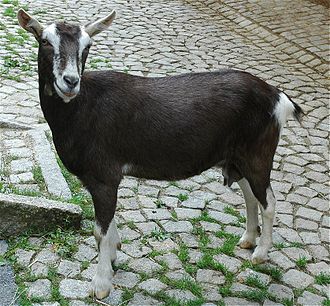Difference between revisions of "AY Honors/Goat Breeds/British Alpine"
From Pathfinder Wiki
m (2 revisions: re-import from WB, including edit history) |
m (+ translate tags) |
||
| Line 1: | Line 1: | ||
| − | {{Breed id | + | <languages /><br /> |
| + | <noinclude><translate></noinclude> | ||
| + | |||
| + | {{ | ||
| + | |||
| + | Breed id | ||
|name = British Alpine | |name = British Alpine | ||
|image = Thueringerwaldziege.jpg | |image = Thueringerwaldziege.jpg | ||
|description= | |description= | ||
The Alpine is a large breed of dairy goat which may have a variety of coat colors. British Alpines are black with white markings. They are best suited to temperate climates and do not do well in humid environments. Alpines have erect ears, and multiple coat colors are acceptable. The Alpines are excellent milkers and can produce milk over an extended period of time. The Alpine is the second most registered of the dairy breeds. Average milk fat content for Alpines was 3.5 percent in 2003 and average milk production per doe was 2,083 pounds, according to national Dairy Herd Improvement statistics. | The Alpine is a large breed of dairy goat which may have a variety of coat colors. British Alpines are black with white markings. They are best suited to temperate climates and do not do well in humid environments. Alpines have erect ears, and multiple coat colors are acceptable. The Alpines are excellent milkers and can produce milk over an extended period of time. The Alpine is the second most registered of the dairy breeds. Average milk fat content for Alpines was 3.5 percent in 2003 and average milk production per doe was 2,083 pounds, according to national Dairy Herd Improvement statistics. | ||
| + | |||
}} | }} | ||
| + | |||
[[Category:Adventist Youth Honors Answer Book]] | [[Category:Adventist Youth Honors Answer Book]] | ||
| + | <noinclude></translate></noinclude> | ||
Revision as of 14:33, 10 May 2018
British Alpine
The Alpine is a large breed of dairy goat which may have a variety of coat colors. British Alpines are black with white markings. They are best suited to temperate climates and do not do well in humid environments. Alpines have erect ears, and multiple coat colors are acceptable. The Alpines are excellent milkers and can produce milk over an extended period of time. The Alpine is the second most registered of the dairy breeds. Average milk fat content for Alpines was 3.5 percent in 2003 and average milk production per doe was 2,083 pounds, according to national Dairy Herd Improvement statistics.

